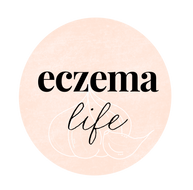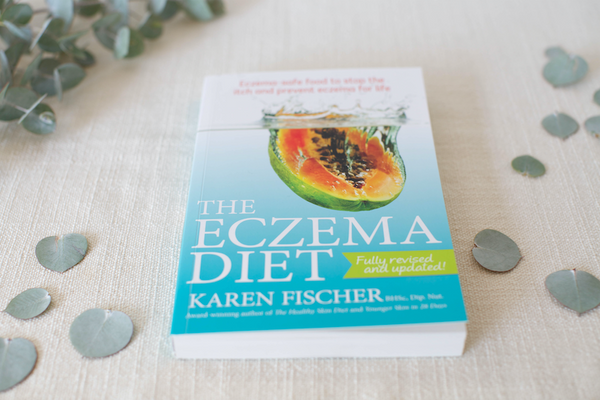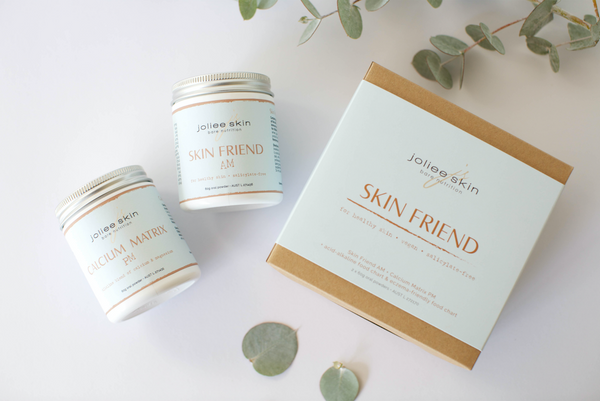The Eczema Diet - Problem Solving
Q: "I have begun The Eczema Diet program and I'm not sure if my skin is getting better. During the first two weeks it seemed to be worse. Is this a detox reaction?"
Maybe... A detox reaction can occur when anyone changes their diet from eating fatty foods, dairy, sugar and caffeine to any type of health food program that is free from these ingredients. Cutting sugar and/or caffeine out of your diet can especially trigger adverse effects as these substances are highly addictive. As a result the body may experience withdrawal symptoms similar to what a drug addict can go through. However, this is rare in The Eczema Diet as it does contain healthy sources of sugars to prevent sudden withdrawal. If you are used to consuming cola, coffee, teas (black, white and green tea) and chocolate/cacao then you may experience caffeine withdrawal, which should subside in a week or two.
About 10% of people experience a worsening of symptoms or a healing crisis (detox reaction) while on The Eczema Diet. Again, this is a very low amount and most people do not need to worry about experiencing a detox reaction.
What is a detox reaction?
A detox reaction is a temporary worsening of your eczema before it gets better. Symptoms include peeling or flaking skin, lethargy, increased itch, redness and/or headaches. This can be caused by sugar-withdrawal, candida die-off or caffeine withdrawal (or from the detoxifying Therapeutic Broth). If it is a detox reaction, the symptoms will subside within 1-3 weeks. Also check our 5 problem-solving tips below.
Q: "How soon can I expect my skin to clear up?"
Your eczema should begin to clear up within 6 weeks and best results can be seen in 12-weeks. If you have suffered from severe eczema for more than 20 years, then it can take up to eight months for your skin to clear up (a short period of time compared with 20+ years of suffering). During this time it is essential to have nutritional support which is why I recommend Skin Friend. Often people with skin inflammation are deficient in zinc, B vitamins and a range of nutrients, and they don't absorb enough nutrients via their diet due to poor absorption so it's important to take supplements.
Note the Eczema Diet is not a quick-fix to simply suppress inflammation (like topical steroids). The diet is designed to improve genetic health so as you can imagine this can take a while, especially if you have many food sensitivities and topical steroid withdrawal/red skin syndrome.
If your skin is not starting to clear up after 8-12 weeks on the diet, try these 5 problem-solving tips to clear up your eczema. You can also utilise these tips at the beginning of your program so you know what to look out for on your journey to clear skin.
TOP FIVE TIPS FOR CLEAR SKIN
1. Check for undiagnosed allergies/sensitivities to common foods.
I have worked with eczema patients who only had mild improvements in their eczema while following The Eczema Diet and this is what I discovered: some people have unusual sensitivities that don't show up in allergy/sensitivity tests. Once diagnosed, (and combined with the Eczema Diet program), the itch subsides quickly and the skin starts to heal.
Rice: Two of my toddler patients were allergic to rice, and no they were not Asian (as rice allergy is more common in Asians who eat a lot of rice). The signs were eczema appearing when solids were introduced when they were babies. Their eczema cleared up while on The Eczema Diet when the mothers also took all rice products out of their diet.
Cashews: Raw cashews are allowed in the diet as they are amine-free and salicylate free. However, people with eczema are often allergic to nuts so you have to be cautious with cashews. I kept raw cashews in the diet mostly for variety - as not all people are sensitive to them. But if your skin is not clearing up, do the diet cashew-free.
Potatoes: While most people can eat peeled potatoes with no negative reactions, a small percentage of people with eczema (about 5%) are sensitive to potatoes. If you react to potatoes simply leave them out of the Eczema Diet.
Potato skins: Also note there is a typo in the Eczema Diet book - it says you can add "potato peel" to the broth recipe. Note potato skins contain salicylates so they can trigger itchy skin so always peel your potatoes while following The Eczema Diet.
Celery and pear: I have one patient who flares up when she eats these ingredients. And her skin clears up when the Eczema Diet is free of these ingredients.
Carrots, beetroot, and sweet potato: Most of my patients do well eating these healthy, alkalising vegetables but a few do not... My patients with head-to-toe severe eczema are usually highly sensitive to salicylates and their skin clears up when they also take these medium salicylate foods out of their diet. They also take Skin Friend to help clear up their salicylate sensitivity and eczema.
Grains: 99.9% of my patients do well eating grains and foods such as rice, quinoa and buckwheat help them to feel full and satisfied. However, I have had a couple of patients who have bowel symptoms when eating grains and they do better without grains and slightly more protein (plus the eczema-friendly vegetables from the book).
Papaya: Only 3 patients have reported sensitivity to papaya and they are usually the patients with severe salicylate sensitivity. If you react to papaya or pawpaw, simply avoid them and have peeled pear instead (and banana if you are not sensitive to banana or amines/histamines).
Broth or meat: If you are sensitive to amines, you will need to avoid the therapeutic broth, slow cooked meats and meat/fish leftovers that were refrigerated overnight, as they all contain amines. TIP: Cook meats fresh on the day you are consuming them.
Banana: Some people are allergic to bananas, possibly because bananas contain some amines so it could be related to amine sensitivity. Avoid banana if necessary.
Soy: I have recently seen a lot of patients who are sensitive to soy. While the statistics say only 4% of eczema sufferers are sensitive to soy, I think the numbers are rising. Soy is hidden in lots of foods, especially breads. Hidden soy is also in most vitamin D and vitamin E supplements and many other multi-vitamin supplements - so avoid these if you are sensitive to soy.
Eggs: Even if you don't have an egg allergy, some people do much, much better when they avoid eggs. Possibly because they can be pro-inflammatory. It's advised to avoid eggs until your eczema has cleared up, then you can test them and see if your skin reacts.
............
Favourite foods that could worsen your eczema
Avocado, coconut and almond milk: Note every second blog recommends these ingredients to clear up eczema however these foods are not a part of the Eczema Diet because they are all rich sources of itchy chemicals called salicylates. If you are one of the 60-75% of people with eczema who are sensitive to salicylates your eczema will not clear up when you consume these products - your eczema could actually get worse.
I have had many people report that avocado and coconut water/milk etc. worsens their eczema but they keep eating them because everyone says they are good for eczema. Not so! And there are many more who say they don't react to these foods (but their skin is red raw and so itchy they cannot sleep. This is a sign you are reacting to foods in your diet... and coconut, nuts and avocado could be part of the problem.
Most people do not realise they are sensitive to salicylates until they try the Eczema Diet (or visit the RPA Hospital Allergy Unit where the scientific research originated). The Eczema Diet will help you identify this common problem so you can finally clear up your eczema. No eczema program is complete without first testing for salicylate sensitivity to see if you are one of the 60+ percent who need to avoid salicylates to quickly clear up your eczema. What's unique about The Eczema Diet program is the goal to reverse the food/chemical sensitivities so you can successfully expand your diet and remain eczema-free. To do this, the Skin Friend supplements are often required.
............
2. Check your supplements
Unfortunately many supplements come with hidden additives, fillers, soy, GMO ingredients, artificial beta-carotene, colours, flavourings, fruit/vegetable extracts and herbs which can irritate eczema.
Avoid Probiotics and Fish Oils: If you are sensitive to amines (histamines), you should avoid probiotics and fish oil supplements as they are rich sources of amines. I have heard from many patients and readers who say that their eczema worsened with probiotics and their eczema improved once they avoided using them.
Fish oil can cause the same adverse reactions. Omega-3 is important for healthy skin so you may need to take flaxseed oil capsules or eat freshly ground flaxseeds or chia seeds, instead of fish oils. As they both contain amines (but less amines than fish oils and probiotics), so begin with 1 flaxseed oil capsule daily and wait three days to see if you react.
Avoid Herbal Supplements: While herbal supplements have been known to help (I am not knocking them), I have heard many cases where they have worsened eczema. It's important to not mix therapies. I have seen a number of patients who have had severe adverse reactions to herbal supplements which have made their skin weep and crust, and their skin is calmer when they stop taking them.
So avoid herbal extracts, fruit extracts and herbal supplements while following The Eczema Diet as they are very rich sources of salicylates and they may negate your results.
Alternatively take salicylate-free, amine-free supplements: Skin Friend AM and PM.
3. Don't drink tea
Teas and herbal supplements: Avoid teas and herbal extracts as they are rich sources of salicylates. Yes even oolong tea. I say this with love: if your eczema has not cleared up on these teas and therapies, stop them for 12 weeks and try the Eczema Diet.
It is a low salicylate program so you need to stick with low salicylate foods and supplements to see if they help you. I have seen many people become eczema-free by temporarily reducing their intake of salicylates.
To do the Eczema Diet correctly it's important to not mix therapies for 12 weeks. If you do, you'll never know what is really helping you and you could negate the beneficial effects of The Eczema Diet.
If you really need a cuppa, organic decaf coffee is low in salicylates - just have it with non-dairy milk (organic rice/soy if not allergic to soy). Avoid dairy, almond milk and coconut products as they can worsen eczema and affect your results on the Eczema Diet (coconut and almonds are rich in itch-promoting salicylates).
4. Check your moisturiser
Moisturisers which are unpreserved can harbour bacteria and as you have broken skin the moisturiser can transfer the bacterial infection to your skin. This can prevent your eczema from clearing up and antibiotics may be required.
There are some people who are going through Topical Steroid Withdrawal who do better when they stop using moisturisers all together (they call it 'moisturiser withdrawal'). I'm not suggesting you do this unless it's absolutely necessary as eczema moisturisers, when you find one that suits you, can be soothing. Just ensure it's not contributing to infections.
Also get a doctor to do a swab of your eczema to check for bacterial infections. If your skin is infected then antibiotics are usually required.
5. You might have nutritional deficiencies
Eczema and inflammation can cause nutrient losses in the body, and eczema itself can be triggered by nutritional deficiencies. That's why supplementation is an essential part of your healing.
At the Eczema Life Clinic we have seen patients with eczema do much better while using supplements. It has helped them to expand their diet faster; patients with hair loss/loss of eyebrows and clumps of hair falling out, have seen their hair grow back within a month. They skin feels more hydrated, less painful and smoother too. These supplements are now available without prescription.
While on the Eczema Diet it is crucial you have nutritional support as the diet is dairy free. Skin Friend contains the nutrients recommended in the Eczema Diet and you only need to take the two supplements in the pack (not ten, if buying them separately).
If you are still experiencing flare-ups, check out the online Eczema Diet Membership. There are no appointments necessary to speak to Karen and her team of nutritionists on the support forum.
For more information see our Skin Friend supplement >>


